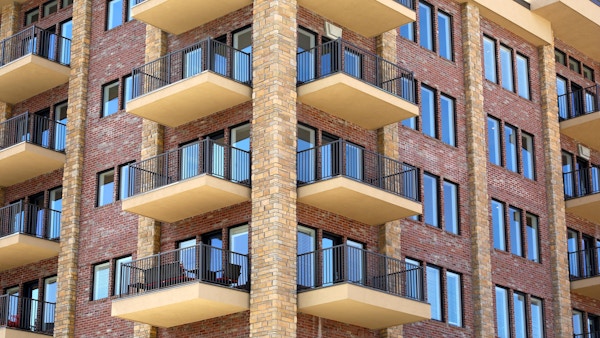Zach and Beth discuss Amazon’s expansion into the growing multifamily market and how building materials manufacturers can successfully implement similar tactics.
More About This Show
The Smarter Building Materials Marketing podcast helps industry professionals find better ways to grow leads, sales and outperform the competition. It’s designed to give insight on how to create a results-driven digital marketing strategy for companies of any size.
In this episode, Zach and Beth talk about three basic principles manufacturers can use to take advantage of growth in the multifamily market by targeting both builders and property managers.
_________
Multifamily completions have grown almost every year over the last decade, but capitalizing on that increase may not be as easy as it sounds.
Amazon, however, has found great success growing their smart home technology sales in this space, largely outlined in a recent Wall Street Journal piece by Christopher Mims: Amazon’s Plan to Move In to Your Apartment Before You Do.
Amazon has placed a lot of resources into building a team of people devoted to growing smart home technology sales in the multifamily space, in addition to new home construction and hoteliers. The need for this aggressive strategy is an attempt to own the market in the face of smart home product competition from Google and Apple.

No matter what type of materials you sell, you can utilize three tactics to grow your efforts with builders and property managers in the multifamily construction space.
Integrate Technology With Your Product
Amazon is partnering with multifamily builders and home builders to create “Alexa-fied” spaces. Renters would not normally be able to install smart home features, such as smart plugs, but when a place is pre-installed with these features, it’s viewed as a huge perk. The same holds true for new-home construction properties as well.
For example, Lennar, the nations’ largest construction company by revenue, has partnered with Amazon to install smart-home technology in their new builds. This is a huge differentiator from its competitors without investing heavily in additional products.
As a manufacturer, it’s important to offer a value proposition for builders and property management companies so that they can be more competitive than other properties nearby.
Amazon knows that for builders, they’re driven by getting people in and for property managers, it’s about improving the living experience. If you sell a product like roofing, flooring or siding, you need to find what’s unique about your product to create a strong value proposition for these audiences.
And while you can’t necessarily get in the tech space as a building materials manufacturer, you do need to understand the potential for your product to integrate with smart home devices. It’s predicted that smart home purchases will increase by 27% in 2019. It’s not at full adoption yet, but Amazon is expecting it to be soon.
To prepare for this ongoing and increasing shift, all manufacturers have the opportunity to integrate with smart home devices using voice search and technology. In short, supplying information via voice is the next big thing.

Here’s a great first step. Go to https://answerthepublic.com/ and type in your product category. You’ll see all the questions people ask around your product or industry. You can then start developing online content to answer those questions, and you’ll be a leader in a space that nobody else is in.
Here’s another way to look at it. Today, 1-in-4 Americans now have a smart speaker in the home. Not only are they being used to play music, but people are also asking questions about how to improve their home or about their other home projects.
As a stronger percentage of Millennials enter the homebuyer space, this trend of utilizing Siri, Alexa and Google home will only grow. You want those devices to be ready to answer buyers’ questions with your products in mind. This needs to be the baseline of your product and tech intersecting.
Making the Lives of Builders and Property Managers Easier
Amazon makes the lives of builders and property managers easier. With Alexa installed in apartment units, it makes the rental listings more attractive and can also reduce the number of callbacks for property managers.
This tactic amounts to creating a perceived value. Smart speakers aren’t expensive, but if you’re moving and already stressed out, having one in your home can make life easier and more efficient. The perceived value is high, even if the actual cost was only a few hundred dollars.
At last week’s AIA show in Las Vegas, Zach saw an insulation manufacturer create a sound booth that completely shut out noise from the showroom floor. It’s a perfect example of showing your leads how a product works rather than just telling them how it works.
Focus on the Living Experience
Manufacturers need to hone in on what kind of display to use that calls attention to features that homeowners don’t know to look for but add real value when living in the space. 90% of manufacturers are in the B2B business, but your customers are B2C.
At some point, your product is being used by the end consumer, so it’s important to think about them as well. The end customer doesn’t focus on technical things like R-value or installation time. They care about the living experience. If you can provide your B2B customers with that kind of information that they can use to sell to their customers, you’ll win.
When taking a cue from Amazon, think about issues that builders and property managers really care about every day and include that value proposition into your messaging.
Do you have more questions or thoughts on how to use Amazon tactics in your marketing efforts? We’d love to hear them! Send us an email at [email protected] and let us know what you think.





